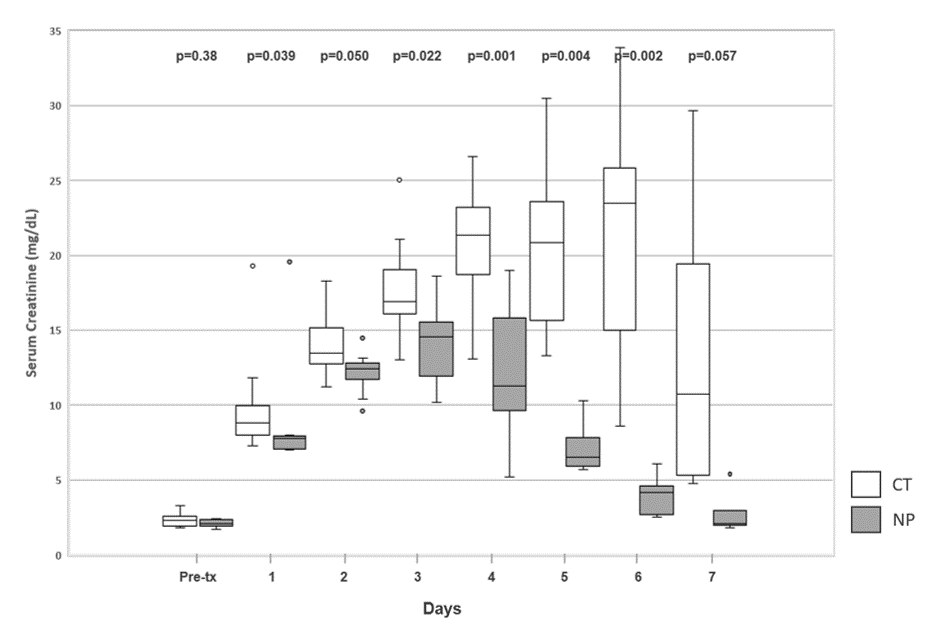Ex Vivo Normothermic Perfusion Improves Cold Ischemic Injury and DGF in an Experimental Model of DBD Kidney Transplantation
1Nephrology, Hospital Universitario Miguel Servet (HUMS), IIS Aragón, Zaragoza, Spain, 2EBERS, Zaragoza, Spain, 3Urology, HUMS, Zaragoza, Spain, 4Pathology, HUMS, Zaragoza, Spain, 5Hematology, HUMS, Zaragoza, Spain, 6Experimental Surgery, IACS, Zaragoza, Spain, 7Faculty of Health Sciences, San Jorge University, Zaragoza, Spain, 8EUPLA, Zaragoza University, Zaragoza, Spain, 9Department of Mechanical Engineering, Zaragoza University, Zaragoza, Spain
Meeting: 2020 American Transplant Congress
Abstract number: B-350
Keywords: Brain death, Ischemia
Session Information
Session Name: Poster Session B: Ischemia Reperfusion & Organ Rehabilitation
Session Type: Poster Session
Date: Saturday, May 30, 2020
Session Time: 3:15pm-4:00pm
 Presentation Time: 3:30pm-4:00pm
Presentation Time: 3:30pm-4:00pm
Location: Virtual
*Purpose: Cold ischemic (CI) injury results in high rates of DGF, reduced graft function and survival. Ex vivo normothermic perfusion (EVNP) has shown to improve IRI in several conditions, but there is little evidence of the EVNP effects on kidney CI injury. The aim of this study was to measure the impact of EVNP after a long cold storage in a swine kidney model of DBD
*Methods: Left kidneys from female pigs were cold stored for 20-hr in the control (CT) group (n=13) or the same period followed by 3-hr EVNP in the NP group (n=8). Kidneys were then reimplanted, a contralateral nephrectomy performed and renal function measured over 7 days. During EVNP kidneys were perfused with an erythrocyte-based solution, nutrients, insulin and a vasodilator. Urine volume was continuously replaced. Flow rate, arterial pressure, urine, temperature and oxygen saturation were recorded continuously.
*Results: Post-transplant, 62.5% (5/8) animals survived in the NP group compared with 30.8% (4/13) in the CT group, without reach statistical differences in the survival curve (Fig. 1, Log-rank p=0.237). Deaths were mainly due to the severity of CI injury and DGF. From the first post-transplant day, renal function (creatinine (Cr) values) showed a growing difference between the 2 groups, and the NP group showed statistical inferior values until the 6th day (Fig. 2). The demonstration of statistical differences on the 7th day was limited by the small number of surviving animals in the CT group.
*Conclusions: A short period of EVNP following the renal preservation period in a swine auto-transplantation model of DBD kidneys improves graft condition, diminishing CI injury and DGF.
To cite this abstract in AMA style:
Gutierrez-Dalmau A, Alastrue V, Jalon ÁGarcíaDe, Sánchez M, Agua CDel, González VP, Roncales Á, Gómez-Arrue J, Pastor C, Sáez B, Esteban LM, Gil MJ, Doblaré M, Borque-Fernando Á. Ex Vivo Normothermic Perfusion Improves Cold Ischemic Injury and DGF in an Experimental Model of DBD Kidney Transplantation [abstract]. Am J Transplant. 2020; 20 (suppl 3). https://atcmeetingabstracts.com/abstract/ex-vivo-normothermic-perfusion-improves-cold-ischemic-injury-and-dgf-in-an-experimental-model-of-dbd-kidney-transplantation/. Accessed February 23, 2026.« Back to 2020 American Transplant Congress


